SPOTLIGHT: Pollard on goalkicking & Manie Libbok
INTERVIEW: Handré Pollard was destined to make a late return to the Springbok squad, kick 13 consecutive goals, and steer the greatest South African team of all time to a second-consecutive World Cup title.
It’s a compelling narrative, one that has been strengthened in recent weeks as the South African sharpshooter has guided Leicester to several important wins in the Premiership.
Three months ago, however, there was no talk of destiny and greatness. If anything, fate had dealt Pollard a cruel hand. The opportunity to represent the Boks at a third World Cup and win back-to-back titles appeared to have passed him by.
He watched the World Cup showdown between Scotland and South Africa in Marseille from the comfort of his own home, and when Manie Libbok found Kurt-Lee Arendse with a no-look kick-pass for one of the tries of the tournament, he celebrated wildly alongside friends and family.
His transition from player to fan was complete.
A few days later, he got the call that set him on a different course.
Malcolm Marx had sustained a campaign-ending injury, and instead of calling up a replacement hooker, coaches Rassie Erasmus and Jacques Nienaber wanted their first-choice flyhalf back in camp as soon as possible.
“Just when I’d written my World Cup chances off, I was back in the mix,” he remembers.
“The last thing I wanted was for one of my teammates to get injured, and to lose a player of Malcolm’s quality is never good for the team. Nevertheless, I was thrilled to receive that call.”
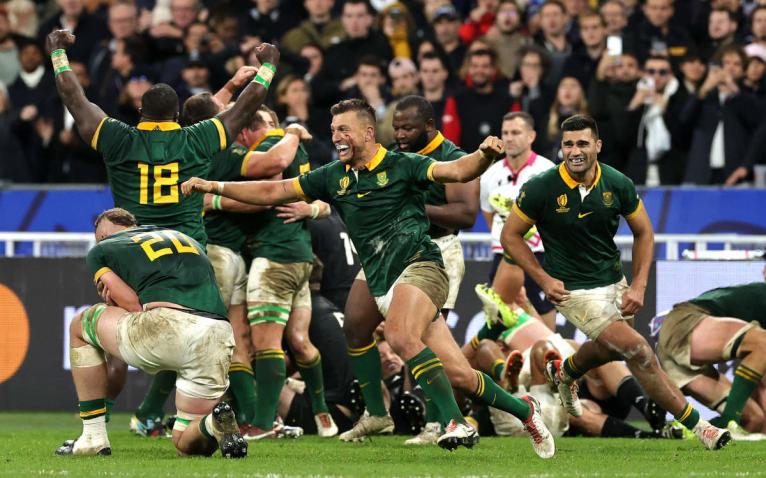
The expectation to perform has been immense since he accepted an offer to join the Bulls at the age of 16, and in the ensuing years, he’s guided South Africa to an Under-20 World Rugby Championship title, two senior World Cups, a British & Irish Lions series victory and a Rugby Championship triumph.
He also won the Top 14 title with Montpellier in 2022.
Many of those successes, however, were preceded by serious injury setbacks.
Pollard spent most of the 2016 and 2017 seasons on the sideline due to injuries and an infection resulting from surgery. He returned to spearhead the Bok resurgence in 2018, and helped the Boks win the 2019 World Cup.
Less than a year later, he tore knee ligaments while on duty for Montpellier. He fought his way back and helped the Boks clinch a tightly contested series against the British & Irish Lions.
He sustained yet another knee injury in the 2022 Rugby Championship, and after making a successful return for Leicester, he broke down with a problematic calf ailment that threatened to derail his 2023 World Cup ambitions.
I was in a chilled space back in May, looking forward to the Premiership play-offs and setting myself up for the international season. I had no idea what was around the corner.
He laughs when he’s asked to reflect on the bizarre pattern of his career – and concedes that the recently completed Test season will go down as the maddest of the lot.
“It has to be, man. I was in a chilled space back in May, looking forward to the Premiership play-offs and setting myself up for the international season. I had no idea what was around the corner.”
During Pollard’s 14-month absence, the Bok coaches were forced to explore alternatives in the all-important No 10 position. Damian Willemse impressed at the back-end of the 2022 Rugby Championship, while Manie Libbok pushed the side to harness its attacking strengths.
The Boks missed Pollard’s goal-kicking during this period, though. Willemse, Libbok, Cheslin Kolbe and Faf de Klerk were all used in this crucial role, with limited success.
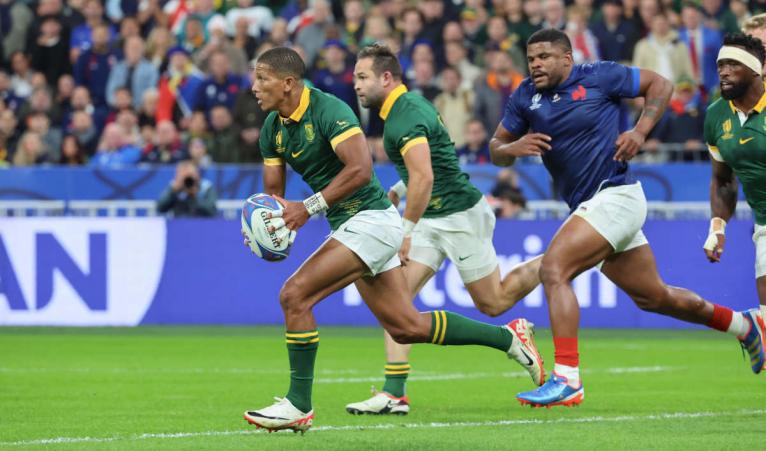
After several missed goal-kicking opportunities cost the Boks dearly in the 13-8 loss to Ireland in Paris, calls for Pollard’s reinstatement grew to a clamour. The veteran was selected to start against Tonga, and despite his lack of game time, most of the South African public and media expected him to bisect the uprights from the outset.
“Vincent Koch joked with me during that week, suggesting that I’d miss my first kick.
“There was a lot of talk about the goal-kicking at that stage, but to be honest, I was more focused on being physically ready for the game. At that stage, I’d only played one game for Leicester.
“I was so determined to go the distance against Tonga that I wasn’t too concerned about the goal-kicking… and maybe that was a good thing. When I hit the first one well, I thought, okay that’s a great start. But my physical and mental focus was elsewhere during that particular week.”
Pollard slotted four-from-four in that 50-minute cameo. When Libbok entered the fray in the second half, he nailed three-from-three. Suddenly South Africa had a reason to hope ahead of the World Cup play-offs.
You fight back from a big injury, and that gives you confidence. Then the next setback comes along, and after a few doubts, you start to remember how you fought back before
When the Bok team was announced ahead of the quarterfinal against France, more than a few eyebrows were raised. Libbok was retained as the starting flyhalf, with Pollard listed on the bench.
The coaches felt that Libbok posed the greater attacking threat to France, and that Pollard – with his game management and goal-kicking experience – was best utilised in the latter stages. This dynamic was retained for the subsequent semi-final against England.
The Boks won both matches by a single point, with Pollard stepping up to nail the match-winning kick on both occasions. In the final, he returned to the starting team and produced a four-from-four goal-kicking performance to clinch a 12-11 win for South Africa.
In the aftermath, he was lauded for his cool temperament across three frantic finishes. These performances could be chalked up to experience, but Pollard feels that his long struggle with injury has also contributed to his mental approach.
“Look, it’s not a skill that players want to acquire. But in the long run, it has shaped my attitude. You fight back from a big injury, and that gives you confidence. Then the next setback comes along, and after a few doubts, you start to remember how you fought back before.
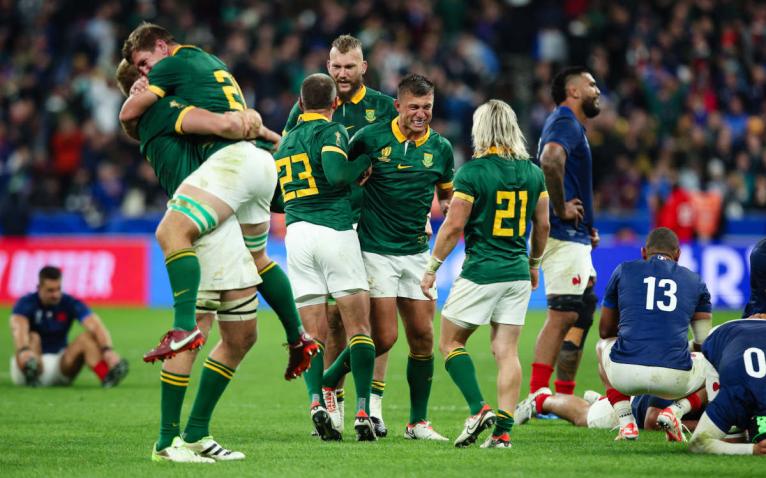
“Maybe I’ve been lucky, because some players don’t make it back after some of these injuries. I will never take anything for granted. But once it’s happened a few times, you start to trust the process and set your sights on that comeback. It gives you some peace to know you’ve walked that road before.”
It’s at this point that Pollard goes out of his way to praise the South African collective. He hasn’t walked this journey alone, and owes a lot to his teammates.
“Siya Kolisi often credits the other leaders for assuming control or easing the pressure. He’s grown into a fine leader over the years, though, and rarely needs our support anymore.
“That allows us to focus on others things. We can keep the guys on task, and provide them with energy when they need it most.
“Willie le Roux has always been the best in terms of coming over and patting me on the back and encouraging me to get ready for what comes next. The public gives him a hard time, and we sometimes laugh at what gets said or shared on social media, because it’s so wide of the mark.
“I cannot say enough for what he does in terms of lifting the team exactly when we need it. It inspires me to try and do the same.”
The build-up to the World Cup quarterfinal against France was always going to be intense, and I don’t think anyone expected the game itself to be that dramatic.
Between the Lions series in 2021 and the recent World Cup, the Boks sustained a number of disappointing losses and relinquished their No.1 ranking. These defeats would shape their approach across the global tournament in France.
“It’s a cliche, but you learn more from your losses than you do from your victories, and some of those losses were absolutely gutting.
“That win against the All Blacks in Nelspruit in 2022 was one of the highlights. We were so emotionally charged for that game, and on the day, we put it altogether to claim a record 26-10 win. The following week, we had a chance to beat them in Joburg, but the reality is that we had nothing left in the tank.
“It was so disappointing at the time, but we learned from it. As a group, we knew that we’d have to win three big games in a row to win the World Cup, and so we couldn’t make the same mistake we’d made after the win in Nelspruit.
“The build-up to the World Cup quarter-final against France was always going to be intense, and I don’t think anyone expected the game itself to be that dramatic. Our approach during that week was a lot calmer, and again the following week ahead of the semi-final. We knew that we couldn’t afford to be emotionally spent by the time we reached the final.”
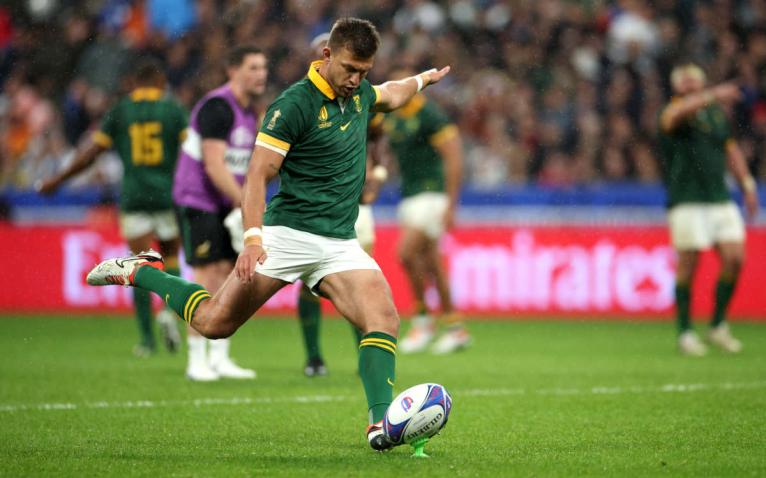
Many of Libbok’s supporters lamented the manner in which the Stormers flyhalf was subbed after 30 minutes in the World Cup semifinal, and then dropped from the squad for the final.
Two years earlier, however, Pollard was managed in a similar manner. In the third and decisive Test against the Lions, the Bok coaches replaced their first-choice flyhalf with a more reliable goal-kicker in Morné Steyn.
It was a fair decision, given Pollard’s goal-kicking struggles at the time, and wholly justified after Steyn slotted two late kicks to clinch the match and series.
“It’s a fair comparison,” Pollards says. “I felt like I made a contribution across that Lions series, and Morné obviously steered us home in that third Test. It was the same with Manie and myself in 2023.
“Manie has made such a positive impact for the Boks.
“A lot of players would have reacted negatively after being left out for the World Cup final, but he was so selfless. He put the team first – and that’s yet another example of what makes this group special.”
For some coaches and players, the 2023 World Cup marked the end of an era. Nienaber has moved on to Leinster, and Duane Vermeulen has hung up his boots.
Erasmus is still at the helm of South African rugby, though, and may convince Kolisi and others to stay on for a few years yet.
A “three-peat” may prove a bridge too far for most of these players, but if the Boks continue to strike the right balance between youth and experience, they may break new ground when they travel to Australia in 2027.
I’m not sure that there is another group like this in rugby, that just simply refuses to give up and always finds a way, no matter the challenge.
“As senior players, we still speak about the dark days of 2016 and 2017,” says Pollard. “It’s great to win World Cups, and some might say that is the reason you play. But to win those trophies in a broader context, considering where we were six or seven years ago… it’s unbelievable.
“You have to credit the management and the coaches for what they’ve done to turn things around. You have to remember that many of the players who were part of the team that struggled back in 2016 and 2017 have gone on to win back-to-back World Cups.
“It took a lot of hard work to get things back on track, but we never forgot the pain of those early years. It was a nice story to win the 2019 World Cup, but it was so important that we backed it up in 2023.
“I’m not sure that there is another group like this in rugby, that just simply refuses to give up and always finds a way, no matter the challenge,” he continues. “The scoreline in the three World Cup playoffs tells a story, but when you think about the past six years, we’ve been fighting non stop. It’s a legacy that we should be proud of.”
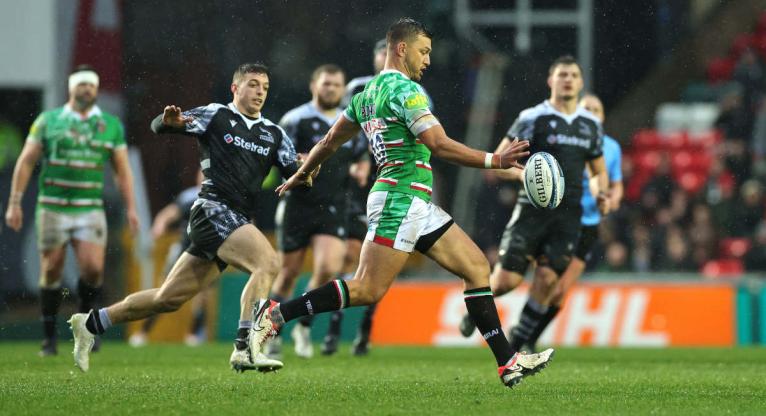
So can they crack on to win a third-consecutive World Cup, and will Pollard, at the age of 33, be the man to spearhead the campaign in Australia? I remind him that Dan Carter was the same age when he guided the All Blacks to the title in 2015.
“That’s the dream, but a week is a long time in rugby, and I’ve learned not to look too far ahead,” he says.
“I’m focused on my role with Leicester at the moment, and I know that the focus in South Africa might change over the next few months as the coaches look at a few younger options.
I will be a father soon, and that has to change your perspective. It’s not that you take rugby less seriously, it’s just that you learn to enjoy it more and not make it the centre of your life
“I grew up hearing about the iconic Leicester Tigers, who had won all of those titles in the 2000s. Now I’m getting the chance to play for them.
“Playing rugby in South Africa and playing rugby at Welford Road… I can’t explain it, it’s so different but both experiences are uniquely special. I’m in a good space with my rugby, and in my personal life.
“We’re expecting, and we couldn’t be happier,” he adds. “I will be a father soon, and that has to change your perspective. It’s not that you take rugby less seriously, it’s just that you learn to enjoy it more and not make it the centre of your life.”
By Jon Cardinell, RugbyPass

























































